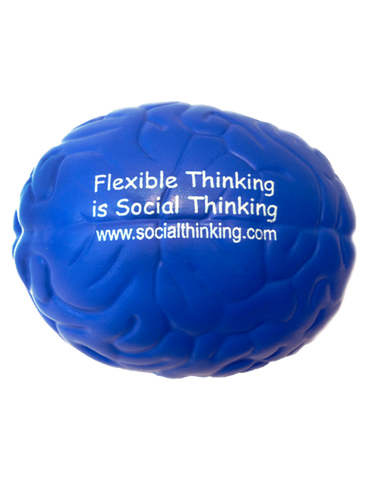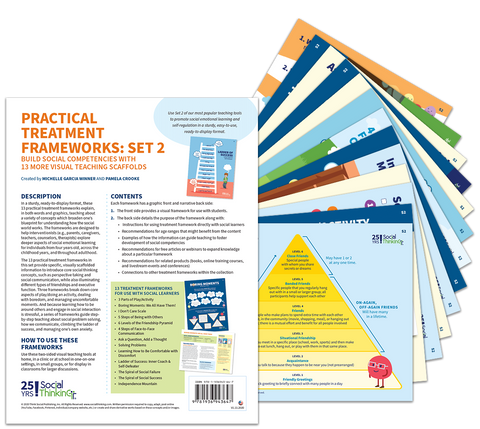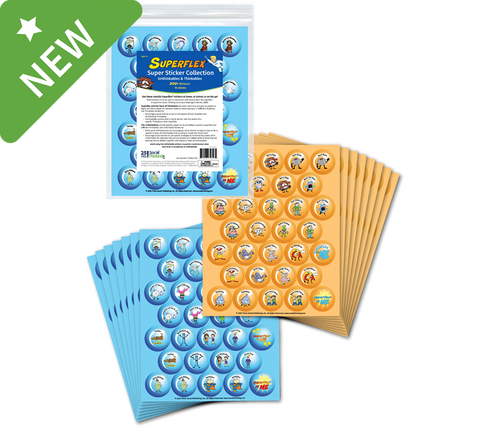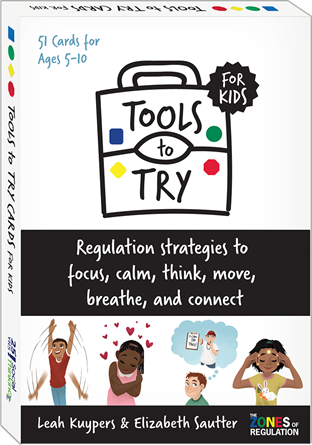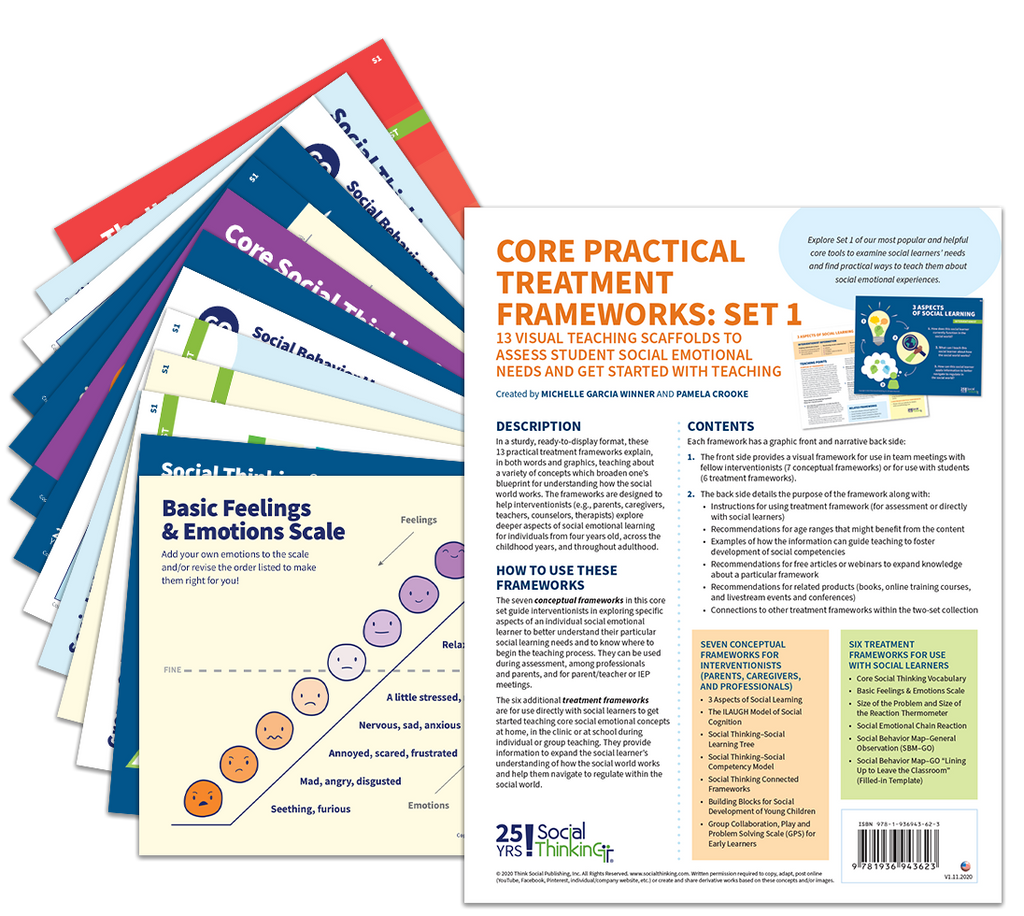
Social Thinking® Frameworks Collection | Core Practical Treatment Frameworks Set 1
Start unpacking the social world with Core Practical Treatment Frameworks: Set 1, part of a two-set collection of 26 visual teaching scaffolds for social learning and self-regulation strategies—curated and distilled for the first time in one practical and user-friendly collection. After 25 years of research, teaching, and learning, we have powerful ideas and concrete strategies for helping interventionists help their social learners see and understand the social world and develop lifelong strategies for meeting their social goals. The majority of teaching frameworks found in this set were first presented in published print products, webinars, articles, On Demand courses, and conferences/livestream events that that are identified below next to the corresponding framework. We strongly urge interventionists to explore these source products for deeper instruction, examples, and learning for using the frameworks in practice.
Core Practical Treatment Frameworks: Set 1 contains 13 of our most popular and helpful core tools with two types of frameworks.
Seven conceptual frameworks provide information specifically for interventionists (parents, caregivers, or professionals) to help them explore the social emotional assessment and treatment needs of individuals. These can be used during student study team meetings, IEP meetings, and to guide interventionists’ exploration of individuals’ social emotional development and treatment needs during the assessment process.
7 Conceptual Frameworks for Interventionists and their Original Source for Deeper Learning
• 13 Aspects of Social Learning (Original Source: Livestream)
• The ILAUGH Model of Social Cognition (Original Source: Inside Out)
• Social Thinking–Social Learning Tree (Original Source: Why Teach Social Thinking?)
• Social Thinking–Social Competency Model (Original Source: Article, On Demand)
• Social Thinking Connected Frameworks (Original Source: Livestream)
• Building Blocks for Social Development of Young Children (Original Source: We Thinkers! Vol. 1)
• Group Collaboration, Play and Problem Solving Scale (GPS) for Early Learners (Original Source: We Thinkers! Vol. 2)
Six treatment frameworks help interventionists get started teaching core social emotional concepts directly to social learners: exploring emotions, size of the problem, and situation-based social expectations.
• Core Social Thinking Vocabulary (Original Source: Think Social!)
• Basic Feelings & Emotions Scale (Original Source: Livestream)
• Size of the Problem and Size of the Reaction Thermometer (Original Source: Poster; Superflex/Glassman)
• Social Emotional Chain Reaction (Original Source: Social Behavior Mapping)
• Social Behavior Map–General Observation (SBM–GO) (Original Source: Social Behavior Mapping)
• Social Behavior Map–GO “Lining Up to Leave the Classroom” (Filled-in Template) (Original Source: Social Behavior Mapping)
What’s a Framework? Each teaching framework provides a kind of blueprint related to one specific aspect within the social world that illustrates the abstract social concept through a step-by-step, visual means. This collection includes a broad array of frameworks that range from assessing learners’ needs to breaking down social concepts, such as social communication, friendship, anxiety management, being with others, and many more to make the abstract concepts more concrete for social emotional learning.
When Do I Use These Frameworks?
Use these two-sided visual teaching tools at home, in a clinic, or at school in one-on-one settings, in small groups, or for display in classrooms for larger discussions.
A Breakdown of What’s Inside Each Practical Teaching Framework
In a portable, 8.5” x 11” format, these 13 practical, treatment framework mini-posters describe, in both words and graphics, a variety of social concepts which either help the interventionist better understand the social emotional learning abilities of a specific student, or the framework provides information which broadens the student’s blueprint for understanding how the social world works.
Each framework has a graphic front and narrative back side. The front side provides a visual framework for use in team meetings with fellow interventionists or for use with students. The back side details the purpose of the framework along with:
- Instructions for using treatment frameworks (for assessment or directly with social learners)
- Recommendations for age ranges that might benefit from the content
- Examples of how the information can guide teaching to foster development of social competencies
- Recommendations for free Social Thinking articles or webinars to expand knowledge about a particular framework
- Recommendations for related products (books, on-demand courses, and livestream events and conferences)
- Connections to other treatment frameworks within the two-set collection
Interventionist Ribbon. Set 1 includes a blend of Interventionist and Social Learner frameworks. The Interventionist frameworks include a green ribbon on the graphic side to differentiate between the two categories.
IMPORTANT NOTE! Frameworks provide a blueprint of these Social Thinking Methodology concepts, in addition to high-level, basic instruction. To ensure your deeper understanding and teaching with fidelity to our methodology, explore the related resources listed on each framework to learn more strategies and best practices.
Who Are the Teaching Frameworks For?
The 13 frameworks in Set 1 are of two types—Interventionist frameworks and Social Learner frameworks—and have two different purposes. The first seven are conceptual frameworks that provide information specifically for interventionists (parents, caregivers, or professionals) to help them explore the social emotional assessment and treatment needs of their children, students, or clients, as well as expand their understanding of the breadth and complexity of the social emotional world. These seven conceptual frameworks can be used during student study team meetings, IEP meetings, and to guide interventionists’ exploration of individuals’ social emotional development and treatment needs during the assessment process. The six Social Learner frameworks are designed for teaching core social emotional concepts directly to social learners ages four through adult. It all begins by creating a mental blueprint in each social learner’s mind to begin exploring, through the use of strategies, how one mind has to consider many minds at once. Within this collection are the visual tools, the concrete blueprints, for guiding interventionists as they teach and support their social learners in discovering how to meet their own social goals within the vast, interconnected social world.
What Type of Learner Benefits from the Social Thinking Methodology?
The many concepts, frameworks, and strategies within the Social Thinking Methodology are designed for individuals who have solid to advanced receptive and expressive language, as well as academic learning skills. Our information taps into metacognitive understanding of one’s own and others’ thoughts and feelings and is designed to help interventionists (e.g., parents, caregivers, teachers, counselors, therapists, and other professionals) teach deeper concepts related to social emotional learning to individuals from ages four years old, across childhood, and throughout the adult years.
All social learners benefit from metacognitive strategies for social problem solving and self-regulation, which are at the heart of our ever-evolving social competencies. This holds true for those on a neurotypical developmental trajectory, as well as for individuals with social learning challenges. These Social Thinking teaching frameworks can be used with individuals based on their social learning needs and not necessarily their developmental ages.
Want to Learn More? Find 13 more Practical Treatment Frameworks: Set 2
Michelle Garcia Winner, Pamela Crooke
- Ages: 4 – adult
- Format: Visual Supports
- ISBN: 9781936943623
- Published: 2020
